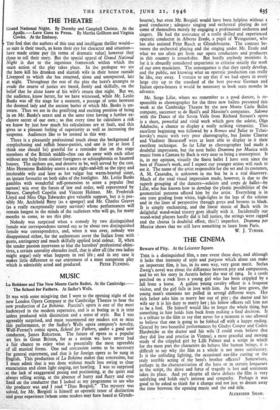THE CINEMA
Beware of Pity. At the Leicester Square.
THIS is a distinguished film, a rare event these days, and although it lacks that intensity of style and purpose which alone can make
an important film, it has, in its own way, very great merit. Stefan Zweig's novel was about the difference between pity and compassion, and he set his story in Austria before the war of 1914. In a castle perched on a rock lives a young girl who has been crippled by a fall from a horse. A gallant young cavalry officer is a frequent visitor, and the girl falls in love with him. As her love grows, the young man's emotions are pulled in severol different ways. Her
rich father asks him to marry her out of pity ; the doctor and his
wife say it is his duty to marry her ; his fellow officers tell him not to be a fool. He himself would like to forget the whole thing, but something in him holds hint back from making a final decision. It
is a tribute to the film to say that never for a moment is one allowed to believe that one is going to be fobbed off with a happy ending. Graced by two beautiful performances by Gladys Cooper and Cedric Hardwicke as the doctor and his wife (I could even believe that they did live and practise in Vienna), a most graceful and moving study of the crippled girl by Lilli Palmer and a script in which for the most part the characters do behave like human beings, it is difficult to say why the film as a whole is not more satisfactory. Is it the unfeeling lighting, the occasional axe-like cutting or the truly terrible acting of the hero's brother officers? Somewhere, perhaps in the characterisation of the hero or in certain longueurs in the script, the drive and force of tragedy is lost and sentiment takes its place. And yet despite all these defects the film is very satisfying and holds one's interest and sympathy. Perhaps it was good to be asked to think for a change and not just to dream away the time between the opening music and the end title.
ALEXANDER SHAW:


























 Previous page
Previous page